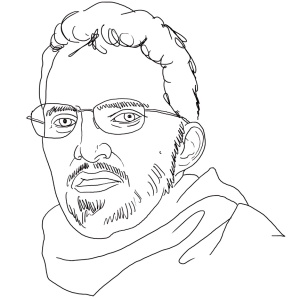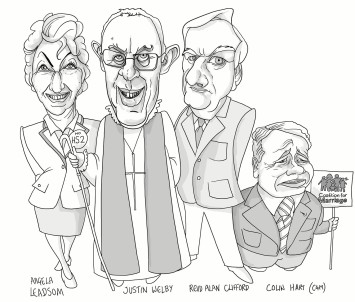
Not at all clear in Islam or in Christianity
A few weeks ago, I posted a lengthy piece about the Biblical texts that appear to condemn homosexuality in the bible, about the way they are sometimes interpreted and about a general progress that has seen a more charitable and positive attitude emerging both in Judaism and Christianity in practice. My article focused on the work of Photios of Constantinople and the distinction that he observed in Paul’s analysis of the Jewish law. On the basis of this, it is possible to see Paul’s statements that appear to be so negative in a much more positive light. Of course, this cannot be the last word and will almost certainly not “do” for the strict evangelical fundamentalists who bombard the internet with such hate and bigotry. Equally, people like the politician, Andrea Leadsom, will undoubtedly continue to pontificate about these 6 scriptural texts as if they really knew what they were talking about. There will always be a sentence here and there that can be plucked from a religious text to defend bigotry and prejudice.
A while back, I was intrigued to find a story about “the Unity” mosque, a relatively secret gay mosque in Paris located in a Buddhist Temple headed by Ludovic Mohammed Zahed. There is a lengthy talk here, though in French. While many imams condemns homosexuality as a perverse “choice”, Zahed said, “Homosexuality is not a choice, and it would be crazy to choose to be gay in the socio-cultural environment I grew up in.”
“Current Islamic ethics condemns this sexual orientation, but in fact nothing in Islam or the Quran forbids homosexuality,” Zahed argues. “Indeed, for centuries, Muslims did not consider homosexuality to be the supreme abomination that they do today.” In his book “The Koran and the Flesh”, he says, “There is nothing about homosexuality that ‘goes against nature’ according to one interpretation of Islam. Quite the opposite…I am sure that if the Prophet Mohamad was still alive, he would marry gay couples.”
Zahed is openly gay and married his partner, Jantjies-Zahed in a version of Nikah (the muslim marriage contract, without which any form of sexual contact is regarded as “haram”). “Common prayer practiced in an egalitarian setting and without any form of gender-based discrimination, is one of the pillars supporting the proposed reforms of our progressive representation of Islam,” he says.
Today, there are reports of a Gay Mosque in Cape Town, so the idea is clearly spreading.
Theory
Now to the theory: There are 5 major verses in the Qu’ran that are generally assumed to condemn gay behaviour unequivocally, but like the 6 texts in the Bible, they are not at all as clear as they first appear. The two main verses are:
1) Surah 7:80-81 refers to Lut, لوط, the Muslim equivalent to the Bible’s Lot. “We also sent Lut : He said to his people : “Do you commit such immorality as no one has preceded you with from among the worlds? Indeed, you approach men with desire, instead of women. Rather, you are a transgressing people.”
2) Surah 26:165: “Do you approach males among the worlds. And leave what your Lord has created for you as mates? But you are a people transgressing..”
(there are often further verses cited about the condemnation of the people of Lut: 11:77–83, 21:74, 22:43, 26:165–175, 27:56–59, and 29:27–33)
3) Surah 27: 55: Do you indeed approach men with desire instead of women? Rather, you are a people behaving ignorantly.” It seems to me that a statement of stupidity, however firmly made, is not quite the same as condemnation.
4) Surah 4: 15: And the two who commit it among you, dishonor them both. But if they repent and correct themselves, leave them alone. Indeed, Allah is ever Accepting of repentance and Merciful. (this is actually about adultery in general)
5) Surah 4:16: The heavens, the Earth and the mountains tremble from the impact of this sin. The angels shudder as they anticipate the punishment of Allah to descend upon the people who commit this indescribable sin.
The last two verses are a bit vague about the reasons for God’s condemnation but the first of these two verses emphasises God’s forgiveness and the context is adultery. This is part of the problem in Islam, that there is a tendency to avoid the use of terms like “liwat” and opt instead for “Al-Fahshah” (Shameful activity) that may or may not denote homosexual sex.
Hadiths
There are also some hadiths: “When a man mounts another man, the throne of God shakes.”
“Whomever you find doing the actions of the people of Lut then kill the one doing it, and the one it is done to” (Al-Hudud) The book on Legal Punishments كتاب الحدود عن رسول الله صلى الله عليه وسلم
مَنْ وَجَدْتُمُوهُ يَعْمَلُ عَمَلَ قَوْمِ لُوطٍ فَاقْتُلُوا الْفَاعِلَ وَالْمَفْعُولَ بِهِ
But despite this, there remains devision among the three major legal schools of thought. The Hanafite (in South and East Asia) generally believes no punishment is necessary, the Hanabalites (the Arab world) believe in severe punishment following the example of Abu Bakr who had a gay man burnt at the stake and the Sha’fis (also mostly in the Arab world) require extra witnesses to the homosexual act before punishment is carried out. About 4,000 gay people have been executed in Iran since the revolution in 1979.
Variety of interpretations
Because Islam is a Religion of the Book, it would seem reasonable to suppose that everything should be clear, but in this case, everything is not clear and there is a range of response to homosexuality that extends from execution to toleration and now a range of acceptance.
Some scholars today claim that there are no explicit condemnations of homosexual activity in the Qu’ran and some people stress that what the people of Lut do wrong is to reject his prophethood. They are condemned for their lack of faith, not their sexual behaviour. (Scott Kugle Homosexuality in Islam. Oxford, England: Oneworld Publications. pp. 42–49). The Hadiths, in contrast, can be very severe. that severity alone means that they can only be relevant in the most extreme societies. In other words, the extremity alone means they are already questioned.
The modern position seems to be that Islam condemns adultery and thus homosexual sex outside a committed relationship. Therefore, within the context of commitment, it cannot be considered wrong.
I will try to deal with some of this again at a later date. Let’s go back to the news report today. Dr Taj Hargey is an Oxford professor at the Muslim Educational centre and seems to be behind the “Open Mosque” in South Africa. There is some precedent here because of the activity of Imam Muhsin Hendricks- a few years ago he said of a Gay Mosque,
Debate
“In the last five years, there have been more discussions and debates than ever before. Just the mere fact that there has been no strong opposition is an indication for me of some sort of acceptance. It just can’t happen publicly now. People understand that if they oppose homosexuality publicly, they could get into trouble. I guess we are kind of blessed in South Africa … I don’t think it would be possible in Iran, Saudi Arabia or Pakistan.” There was also the Indian Parvez Sharma, and the idea of gay Islam was explored in a Channel 4 film, “A Jihad For Love”.
The debate is certainly developing and in some predominately Islamic countries (like Albania. Lebanon and Turkey) there has even been discussion about legalising same-sex marriage. Homosexuality was decriminalised in Turkey in 1858, long before the Oscar Wilde trial in the UK! Lesbianism is legal in Kuwait. That said, one must be careful because countries which profess tolerance are also inclined to impose strict penalties when they are forced into making legal or police statements or challenges. I recall a particular incident in Egypt, a country which has no laws against homosexuality, but where such activity would be seriously ill-considered, about which we will undoubtedly hear more. What is done in private, one might suppose, should remain private. And a last word to the current developments:
Dr Hargey also encourages women to lead prayers. Of course one of Mohammed’s wives, Khadijah, famously led prayers though arguably under special circumstances.
Here is a link to the Christian views analysed

